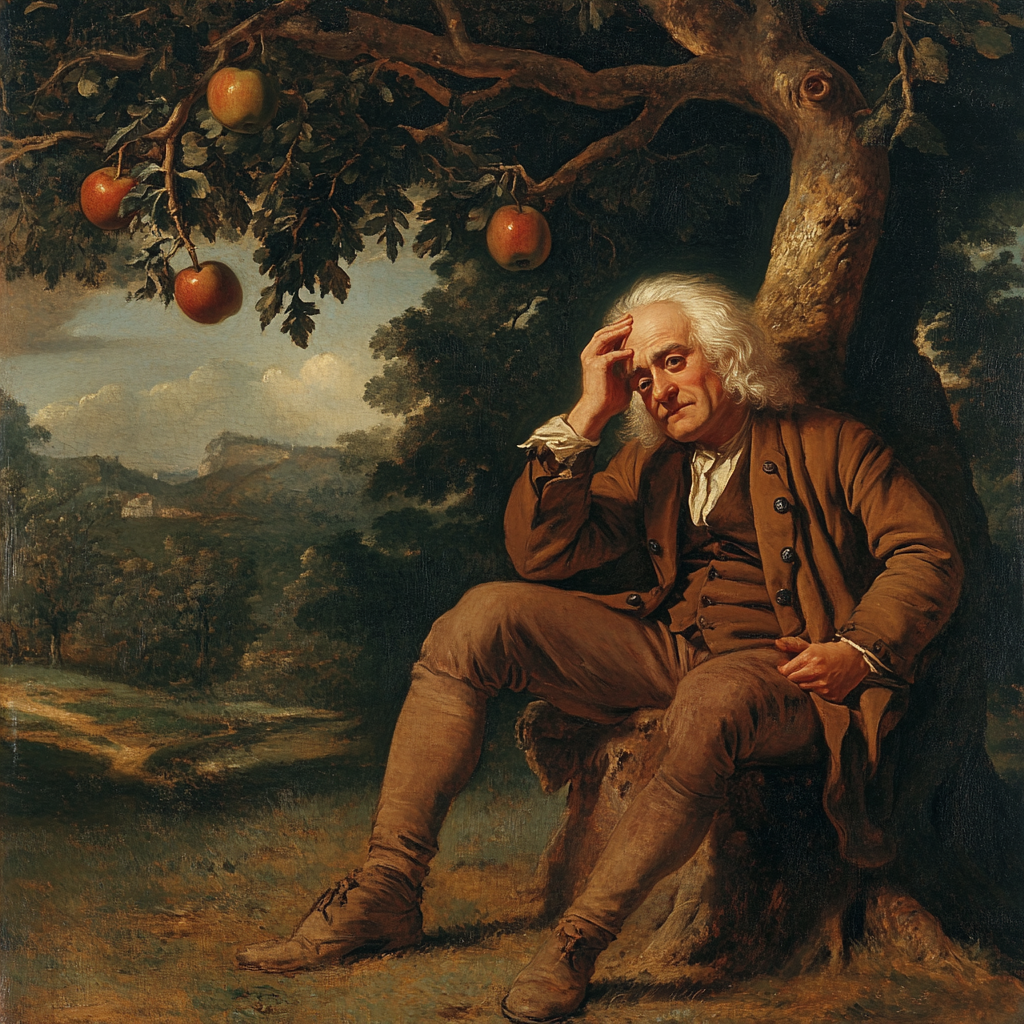For years, I had this mythical idea in my head that a breakthrough was something that a person just suddenly had happened. Newton just suddenly thought about gravity when an apple hit him in the head. Edison suddenly realized that filament needed to be in a vacuum to not burn out from debris and other disruptions in the air. Ben Franklin had an epiphany while flying a kite during a lightning storm. We seem to have built up this cult of false and misleading myths about how famous inventors came up with something revolutionary. Naturally, I believed that. So most of my young life, I was waiting for one of these great ideas to come down from the heavens and knock me in the head. I have learned since that time that this just does not happen by accident; effectively, there never will be an apple hitting me in the head.
The Real Story of the Apple
Which, by the way, much to my dismay, I learned later in life that this whole Apple hitting Newton in the head was a made-up story all along. So not only is the concept wrong, but the entire story is fabricated in the first place. The story can be traced back to Newton’s own account, shared much later in his life. In 1726, Newton told William Stukeley, one of his biographers, about the moment he formulated his ideas on gravity. Newton recalled that he was sitting in his garden when he saw an apple fall from a tree, which led him to wonder why apples always fall straight down to the ground rather than moving in another direction. Later this tale would morph into a fanciful scenario of Newton getting bonked in the head and then having a sudden epiphany. This child’s tale teaches the wrong lesson, although it is fun to imagine.
There Never is a Lightbulb Moment
The reality is that no discovery happens this way. They all happen through an accumulation of effort and research, and somewhere along the way, the person bumps into a successful formula, consideration, or combination that has a relevant and meaningful application. The part of the story of Newton that should be emphasized is after he had this wonder, this curiosity, and the amount of hard work he put into trying to discover a theory that could make sense of this phenomenon. Edison was not just walking around one day and “pop” the light bulb idea came into his head. He already knew voltage would cause the wire to glow, and he knew this could be a light source much like the gas lamp. It took him thousands of iterations when he finally came upon the answer that would allow a filament to burn uninterrupted.
The Discovery of Lithium
I was listening to a story about how Lithium was discovered as a modern therapy source for mental illness. John Cade, an Australian psychiatrist, made the breakthrough while experimenting with different compounds to treat psychiatric disorders. Cade found that lithium salts had a calming effect on guinea pigs and later tested it on patients with mania, observing significant improvements. This was somewhat by accident. His original theory was that there was a substance in urine that would identify what was causing bouts of mania. He had observed during a prison camp in WWII that inmates would calm down after urinating, so he suspected they were excreting an overload of something that was causing these episodes. It was his attempt to emulsify urea that led to this discovery. Lithium salt can aid in this process, which led to this remarkable find.
Even Brittany Worked Hard
Even in this medical discovery, the scientist was engaged in a significant and disciplined study of a problem domain. That led to the discovery, not just a sudden accidental trip on the sidewalk or bump in the head. I have often wondered why we emphasize the sudden discovery or the rise to fame based only on luck and circumstance. We pretend this is true, when most of the time, it is not. We talk about Brittany Spears as if she was suddenly discovered as a natural talent when the reality is far from the truth. The fact is that by the time she was 16, she had put more hours into performing, singing, and dancing than most entertainers do in a lifetime. Yes, sure, she had some chance encounters and circumstances that helped her rise to fame, but to try to portray this as a fortuitous display of cosmic chance is a disservice to the countless people who pour thousands of hours into their craft.
Being Discovered is Overrated
What is this fascination with “being discovered” in our modern culture? I am sorry I have never met a person naturally talented at anything. In my middle school and high school days, there was this young man who had a tremendous aptitude for sports. Not because he was incredibly talented, not any more than any of us running around on the playground. It was because he loved it, and he was constantly doing it. He was on my soccer team growing up as a little kid, but he also played baseball, football, basketball, and ran track. I remember that, in 5th grade, he would play tag football in recess with all of us. He was good, generally fast, but he was average in his skillset. However, by middle school, he was remarkably better. Was that because of natural talent, or was that because every weekday evening, every weekend, he was practicing or engaged in some sporting event? I remember his younger brother hanging around us all the time and trying to play. Everyone beat this little guy, but by the time high school came around, he was the star athlete who even surpassed his brother. I grew up around these boys. I saw them stumble and fall. I saw them throw countless bad passes and miss-kick the soccer ball. I saw them swing and miss just as many times as I did. The difference? I only played one sport and quit after middle school; they did not.
The Best was a Bench Warmer
When I was in high school, the older brother had every track record on our board. The trophy case was full of all his wins, and he was drafted by a big university and got a full ride. He then entered the NFL and sat on the bench the entire time. What makes him different than all the other phenoms that come into major league sports? Physical attributes probably play a factor, circumstance and luck probably, but most of the time, it is just who works the hardest. That is the reality that we all turn a blind eye to as we worship the next young kid who climbs to fame. I do not know what to call this fascination with getting rich quickly, finding sudden fame, or happening upon a miraculous idea that suddenly catapults you to scientific stardom. The one thing I will call it is absolutely false. Maybe there is a case out there somewhere you will find to prove me wrong, but I have been on this planet for over a half-century and have not seen one yet. Every time I look under the covers at success or discovery, I find a person who worked their tail off to find themselves in a situation where they could be successful.
The Apple is Indeed a Myth
In the end, the myth of the sudden breakthrough, the chance discovery, or the effortless rise to greatness is just that—a myth. What truly lies behind every achievement, whether it’s a scientific discovery, a world-changing invention, or even an exceptional performance on the field, is relentless effort, perseverance, and countless hours of practice or study. Newton, Edison, Cade—none of these individuals stumbled into their discoveries by pure chance. They were driven by curiosity, problem-solving, and an unwavering commitment to their craft. Our culture’s obsession with sudden success stories only serves to overshadow the real truth: success is almost always the result of hard work and dedication. There are no shortcuts, no apples falling from the sky to deliver genius in an instant. Instead, it is the accumulation of experiences, failures, and determination that eventually leads to progress. It’s time we embrace the reality of this process and honor the effort behind every great discovery and accomplishment rather than clinging to fanciful tales of overnight success.




